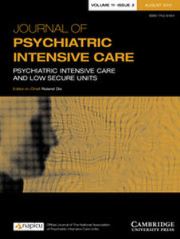It is with considerable sadness that I write this obituary for my NAPICU co-founder, great friend and colleague, Dr Dominic Beer.
Dominic was a school student in Berkshire and then went on to Wadham College at Oxford University. He read modern history and modern languages including German and Latin. Evidence of Dominic's huge capacity for excelling at everything he attempted was clearly represented by the ease with which he switched to studying medicine.
He started his medical education at Guy's Hospital in London in 1978 and qualified in 1984. He did his pre-registration and pre-membership psychiatric rotation within the Guy's Hospital rotation at London Bridge. He also did a post-doctoral research fellowship for the Wellcome Institute for the History of Medicine, completing this in 1990.
Dominic became a member of the Royal College of Psychiatrists (MRCPsych) in June 1989. He then did a senior registrar rotation scheme at Guy's Hospital, which he completed in 1994.
From July 1994, he was the Consultant Psychiatrist for the 15-bed low secure Challenging Behaviour unit at Bexley Hospital, part of Oxleas NHS Trust. This served the London boroughs of Lewisham, Bromley, North Southwark, Greenwich and Bexley in Kent. He developed expertise in intensive care and low-secure challenging behaviour psychiatry during this time.

He also had an active role in teaching on the MSc program at Guy's, King's and Thomas’ (GKT) especially on the anthropology, history and humanities module. He had other teaching responsibilities on the MRCPsych course as well as on the MBBS course at GKT.
He was head of Research and Development for Oxleas as well as being Head of Clinical Audit.
Dominic became a familiar name within the professional press, with over 70 publications including books and book chapters. These were in the area of psychiatric intensive care, low secure care and historical aspects of psychiatry. He was also a regular speaker on the national circuit in the area of intensive care and low secure care. He was assistant editor of the History of Psychiatry, on the editorial board of the Journal of Psychiatric Intensive Care and a referee for various other scientific journals.
In 2000, he was co-editor of the only worldwide textbook on Psychiatric Intensive Care, with a second edition in 2008, published by Cambridge University Press.
Dominic was a key founding member of the National Association of Psychiatric Intensive care Units (NAPICU) in 1995. This was motivated by a paper published at that time, which discussed the poor care and treatment of patients in locked wards.
Dominic was the first chairman of NAPICU from 1997 to 2001. It was his gentle, sensitive, reflective and quiet manner as well as persuasive qualities that laid down some of the fundamental building blocks especially in procedures and operations that has ultimately led to NAPICU being well established today.
In spite of a very busy job and growing family, he spent an enormous amount of time, along with a core group of individuals, in developing the structure and function of NAPICU. He was especially instrumental in having the various regions of the UK affiliated to NAPICU.
Following his chairmanship, he remained on the NAPICU executive committee from 2001 until 2005 as treasurer. On account of his ill health, he subsequently attended the meetings as and when he could. He heroically and uncomplainingly carried on with the activities of everyday living and his role in Oxleas and in NAPICU with a smile even when he was in pain.
He retired from Oxleas NHS Trust in 2010.
In his last few years he took great pleasure in hearing of NAPICU's continued successes. NAPICU has been hailed as being a model association in multidisciplinary working in the UK and as an example for other associations to follow.
All of those in intensive care and low secure care owe Dominic a considerable debt of gratitude, as the initial work started by NAPICU has made a difference to the lives of thousands of our patients with severe and enduring mental illness over the past 17 years.
Dominic's passion for psychiatry could only be rivalled by his passion for cricket in which he was also an enthusiastic participant. Only once in a great while does one come across someone with the great range of skills, intellectual athleticism and selfless compassion that was so evident in Dominic Beer. He will be remembered as a great ambassador for British psychiatry. He was a clinician whose positive impact will be long felt by patients, professionals of all disciplines and the way mental health services are provided.
We, on the NAPICU executive committee have lost a dear friend, mentor and colleague.
He is survived by his wife who is a general practitioner in East London and four children.





